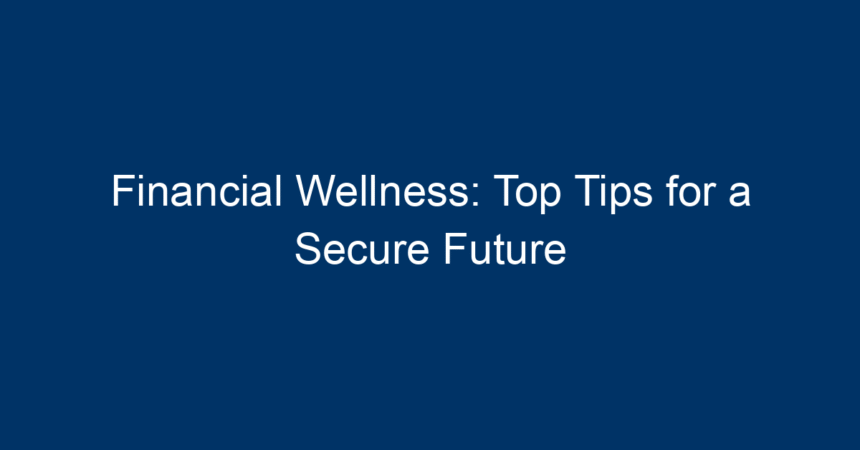In today’s fast-paced world, achieving financial wellness is more than just having a stable income—it’s about creating a balanced financial life that leads to long-term security and comfort. Financial wellness encompasses your overall financial health, including savings, debt management, investment strategies, and budget planning. This article provides actionable tips to help you enhance your financial wellness and secure a prosperous future.
What is Financial Wellness?
Financial wellness is a state of financial health that allows you to live comfortably without stressing over money. It includes various elements such as:
- Budgeting: Understanding and planning your expenses.
- Debt Management: Keeping debt levels manageable and within reach.
- Savings: Building an emergency fund and saving for future goals.
- Investments: Growing wealth through smart investment choices.
Achieving financial wellness empowers individuals to enjoy life while ensuring their financial futures are secure.
The Importance of Financial Wellness
-
Stress Reduction: Financial problems are a significant source of anxiety. Achieving financial wellness can drastically reduce stress levels, leading to improved mental health.
-
Goal Achievement: Financial wellness enables you to set and achieve personal and professional goals, such as buying a home, funding education, or planning for retirement.
-
Emergency Preparedness: With a solid financial foundation, you can handle unexpected expenses, such as medical emergencies or job loss, with greater ease.
- Retirement Security: Financial wellness provides peace of mind that you can maintain your lifestyle during retirement years.
Top Tips for Achieving Financial Wellness
1. Create a Budget
A budget is the backbone of financial wellness. It helps you visualize your income and expenses, allowing you to manage your finances better.
How to Create a Budget:
- Track Your Income: List every source of income you have.
- List Your Expenses: Categorize fixed expenses (like rent or mortgage) and variable expenses (like groceries and entertainment).
- Set Spending Limits: Allocate specific amounts for each category and stick to them.
- Review Regularly: Monitor and adjust your budget monthly to reflect any life or income changes.
2. Build an Emergency Fund
An emergency fund is crucial for ensuring financial wellness. It acts as a safety net in case of unexpected costs.
Steps to Build an Emergency Fund:
- Set a Goal: Aim for three to six months’ worth of living expenses.
- Start Small: Begin by saving a small amount each month, gradually increasing your contribution.
- Automate Your Savings: Set up automatic transfers from your checking to your savings account.
3. Manage Debt Wisely
Debt can derail your financial wellness if not managed properly. Whether it’s student loans, credit cards, or mortgages, a strategy is essential.
Effective Debt Management Strategies:
- Create a Debt Repayment Plan: List all your debts and prioritize them based on interest rates.
- Consider Debt Consolidation: Explore options to consolidate high-interest debts for lower rates.
- Remain Committed: Stick to your repayment plans, and don’t accrue more debt while paying off current obligations.
4. Save for Retirement
Retirement may seem far away, but starting early can dramatically increase your financial wellness in later years.
Tips for Retirement Savings:
- Utilize Employer-sponsored Plans: Take advantage of 401(k) matching contributions if available.
- Open an IRA: Consider Individual Retirement Accounts for additional tax advantages.
- Increase Contributions Over Time: Aim to increase your contributions as your salary grows.
5. Educate Yourself Financially
Knowledge is power when it comes to financial wellness. Understanding various financial products, investment strategies, and market trends can lead to better decision-making.
Ways to Educate Yourself:
- Read Books and Blogs: Find credible sources that focus on personal finance and investment.
- Attend Workshops: Look for local or online workshops to learn about budgeting, investing, and other essential topics.
- Consult a Financial Advisor: Professional guidance can provide personalized insights tailored to your financial goals.
6. Invest Smartly
Investing is a vital component of financial wellness. It allows your money to grow over time, beating inflation and increasing your wealth.
Basics of Smart Investing:
- Diversify Investments: Spread your investments across various asset classes to mitigate risk.
- Understand Your Risk Tolerance: Invest in line with your comfort level regarding potential losses.
- Stay Informed: Keep up with market trends and review your portfolio regularly for necessary adjustments.
7. Practice Mindful Spending
Practicing mindful spending helps you make conscious choices about where your money goes, ensuring it aligns with your values and goals.
Tips for Mindful Spending:
- Distinguish Between Needs and Wants: Prioritize essential expenses over discretionary spending.
- Limit Impulse Purchases: Implement a waiting period (e.g., 24-48 hours) before making non-urgent purchases.
- Reflect on Purchases: Regularly assess whether your spending aligns with your long-term financial and personal goals.
8. Review and Adjust Regularly
The financial landscape and your personal situation can change over time. Regular reviews of your financial wellness ensure you stay on track.
Steps to Review Your Financial Wellness:
- Monthly Check-ins: Discuss your budget and spending habits monthly.
- Annual Financial Review: Evaluate your investment growth, emergency fund status, and retirement savings yearly.
- Adjust Goals: Update your goals and strategies based on changing circumstances, such as job changes or new family responsibilities.
Conclusion: Taking Charge of Your Financial Future
Achieving financial wellness is a journey that requires patience, discipline, and education. By implementing these actionable tips—creating budgets, building emergency funds, managing debt, saving for retirement, and investing wisely—you can secure a stable and prosperous future. Remember, financial wellness is not a destination; it’s a continuous process of growth and improvement. Begin today, take charge of your financial health, and pave the way for a stress-free financial future filled with opportunities.
By prioritizing your financial wellness now, you’re not only ensuring a secure future for yourself but also setting a positive example for those around you.




